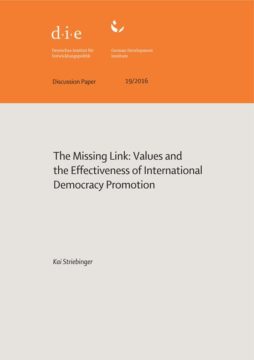Analyses of the effectiveness of democracy promotion rest on assumptions of cultural universalism. The instruments of democracy promotion are expected to work independently of cultural differences. This is surprising because an important body of scholarly work revolves around conceptualizing, measuring, and analysing the impact of the differences and similarities of societal values between countries. Refuting any essentialist explanations of democratization, this paper integrates the general finding that values differ between societies into the existing democracy promotion literature. I argue that the effectiveness of material incentives varies when local actors value material wellbeing or not; that the effectiveness of immaterial incentives varies when local actors value social approval/disapproval by the international actor; and that the effectiveness of persuasion varies when local actors value identities conducive to the promoted norms; and when they value the norms themselves. It cannot be taken for granted that local actors value these four elements. It is therefore necessary to include the value emphases of both the international and the local actors in the analysis of democracy promotion.
- Veröffentlicht am Samstag 14. Dezember 2024 von Deutsches Institut f. Entwicklungspolitik
- ISBN: 9783960210085
- 17 Seiten
- Genre: Gesellschaft, Politik, Sachbücher, Wirtschaft
